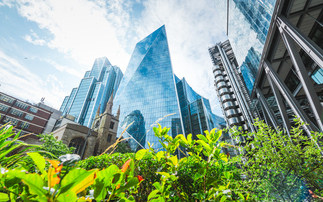Technology giant's annual sustainability report reveals how its products and services helped avoid 13 million tonnes of carbon emissions over the past year
BT reaped £5.5bn in revenue from products and services which it claims helped customers avoid a collective 13 million tonnes of carbon dioxide emissions worldwide last year.
That is one of the headline conclusions from the technology giant's latest annual sustainability report, which yesterday provided an update on its progress towards becoming a net zero business by 2045.
The annual report revealed BT has now achieved a 42 per cent reduction in carbon intensity since 2016/17, putting it broadly on track to deliver on its science-based target to reduce its 2016 emissions by 87 per cent by the end of the decade.
As part of its drive towards net zero, the firm has been measuring the climate impact of products and services it provides, as well as working with suppliers and customers to help them reduce their own greenhouse gas emissions.
As such, the report details how services such as broadband, teleconferencing, remote apps, automation, and cloud-based networking products generated over £5.5bn of revenues worldwide for the firm in 2019-20, while also helping reduce greenhouse gases by cutting energy use, avoiding need for travel, and reducing manufacturing and material demand.
BT said it had helped its customers save three times as much carbon as its end-to-end CO2 emissions, making the grade one year ahead of its 2020 target. "That means for every tonne of CO2e emitted - in our operations, supply chain and from product use - we've helped customers save over three tonnes of greenhouse gases," the report explains.
"Our technology and networks have a huge role to play in enabling the innovative solutions and exponential change needed to achieve a zero carbon economy," said Howard Watson, chief technology and information officer at BT. "We're already purchasing 100 per cent renewable electricity in the UK, and plan to extend that globally in the year ahead. This, together with our plans to decarbonise our buildings and vehicle fleets, will help us to achieve our goal to become a net zero emissions business by 2045."
Further progress has additionally been made in shifting towards clean energy sources, the report indicates, with the firm now sourcing 92 per cent of its electricity worldwide from renewables, up from 86 per cent last year. The firm already sources 100 per cent of its power from renewables in the UK, and is aiming to reach the same level worldwide by the end of this year "where markets allow", it said.
BT also said 181 of its suppliers have now made the switch to 100 per cent renewable power, up from 157 last year. The firm's suppliers must also meet certain standards on energy efficiency, it added.
Energy efficiency efforts continue to deliver savings for the company too. The report reveals that last year it invested £45.3m in building energy management projects in the UK, which helped reduce BT's operating costs by cutting its global energy use by 65GWh, or 2.3 per cent. Since 2009-10, the company claims its investments in energy efficiency have saved it £343m.
The company also revealed that since 2018, when BT agreed what the 'world's first' supplier climate contract clause with Chinese technology giant Huawei, it has agreed similar clauses with 12 of its key suppliers, requiring proof of carbon savings as part of the contract.
However, the company has made somewhat slower progress in shifting its 34,000-strong vehicle fleet in the UK to run on electricity. Last year BT trialled 23 electric vans and ordered 46 more, but conceded the transition to a fully electrified fleet was proving "challenging".
"The market for electric vans is not yet well established and the UK lacks nationwide infrastructure for charging vehicles," the report states. "We're part of the EV100 campaign and we're launching an industry EV Coalition to highlight the need for progress towards fleet decarbonisation."
Elsewhere, the report highlights BT's circular economy efforts, with the firm having last year set a new goal to ensure 100 per cent of the plastic packaging for products it both purchases and sends to customers can be reused, recycled or composted.
In 2019/20, the company produced around 40,500 tonnes of waste worldwide - an increase of 27 per cent from the previous year - of which 96 per cent was recovered or recycled.
The Net Zero Leadership Hub is brought to you in partnership with BT, as part of its support for the Net Zero Leadership Stream at the world's first Net Zero Festival this autumn. All the content on the Hub is fully editorially independent unless otherwise stated.
You can find out more about the Net Zero Festival and reserve your place here.









